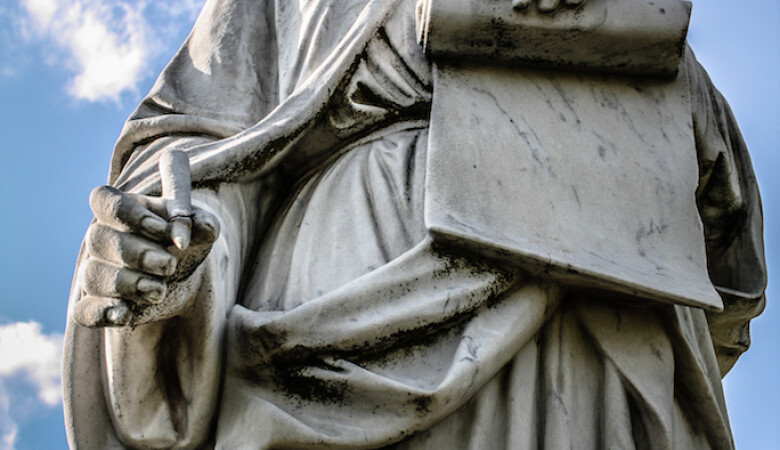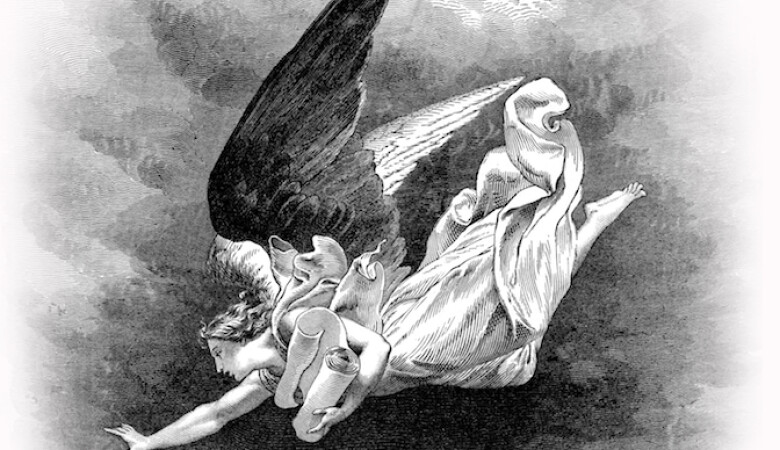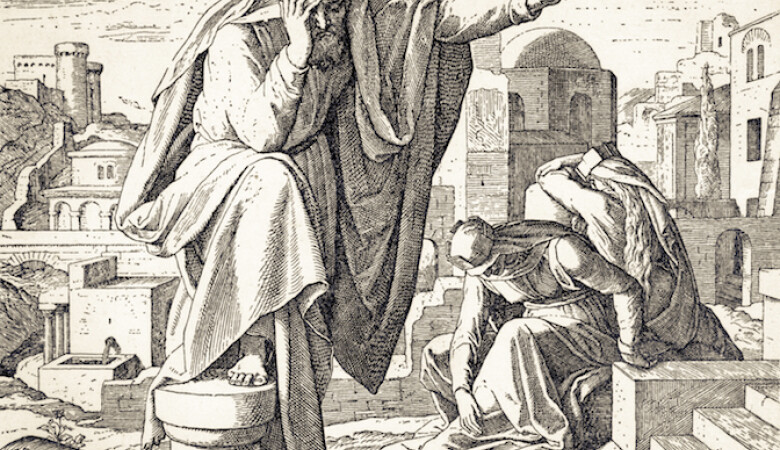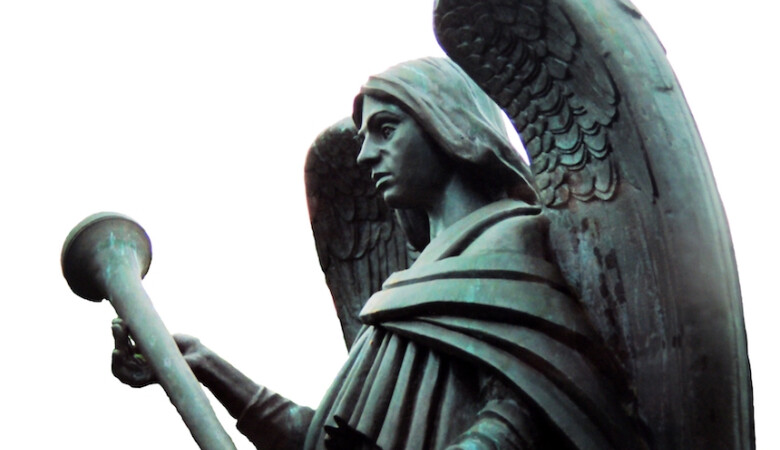Pergamum: Standing for Truth Before Satan's Throne (Revelation Sermon 4 of 49)
March 26, 2017 | Andy Davis
Revelation 2:12-17
Repentance, Holiness, False Teaching & False Teachers
Introduction
Please turn in your Bibles to Revelation 2. This morning we will be looking at Christ's letter to the church in Pergamum. I will begin by asking what you think of conspiracy theories. Some of you may actually be conspiracy theorists, though I do not know. If you do not know what that means, a conspiracy theorist is someone who believes that there is a dark conspiracy of intelligent, powerful individuals seeking to take over and dominate the world. These fearful speculations became popular during the Cold War when there was a concern over Communist infiltration and takeover of our structures. There was also speculation that the industrial military complex was responsible for John F. Kennedy’s assassination rather than a lone gunman. Some have even postulated that landing on the moon is all a hoax, a vast conspiracy. Some of the darker and broader ones go back even to the Middle Ages, to the Knights Templar and to the Illuminati. Even in our midst, some people that you may think are simply upstanding members of the community could be part of this secret society, with secret handshakes and such; things may not be as they appear.
You may wonder why I am starting the sermon this way. It is because I do believe there is a vast, dark conspiracy of powerful individuals that seek to dominate and rule the world for their own glory. You may know exactly who I am talking about. I am talking about Satan and his demonic forces. It is actually more vast than we can imagine. It is more powerful than we can imagine. If we were able to see the demons with our eyes —the powers and principalities, the rulers and authorities — I believe we would quail immediately and be terrified, and how much more if we saw their king Satan, who has been seeking to rule and to dominate the world since time began. The reason I mention it in light of this letter is because Jesus is speaking to a church in Pergamum about whom He says twice, “where Satan dwells” or “where Satan has his throne.”
As the book of Revelation unfolds, we will see all kinds of things revealed that have been hidden from our eyes. First and foremost, we will see the glory of Jesus Christ. In Revelation 1, we have this incredible vision of Christ moving among the seven golden lampstands, which represent local churches; but as He addresses these seven local churches in Revelations 2 and 3 with these seven letters, He is not limiting His audience to those local churches only. At the end of each of the seven letters, we have these words, “He who has an ear, let him hear what the Spirit says to the churches.” Thus, these seven letters in Revelation 2 and 3 comprise a timeless message to all Christians throughout all time. We will see revealed in the book of Revelation the invisible, hidden ministry of Jesus Christ to the local churches. I pray that that will be happening even here in our midst today by the Spirit. In addition to seeing the glory of Jesus Christ, we also have unfolded for us the invisible hidden spiritual realms and the future, where we are headed and what will happen. These things are hidden from our sight; things are not as they appear.
In Revelation 12 in particular, the history of Satan, this ancient dragon, the ancient serpent, the devil, will be revealed. It says there in Revelation 12 that it is he “who leads the whole world astray.” In that chapter, we learn that Satan, a created being, perhaps the most glorious and powerful of all the angels, tried to take over Heaven in some kind of insurrection. Isaiah 14 gives us a picture of his evil ambition to ascend and take over the throne from the Most High in order to supplant God and rule the universe in His place. Satan led a rebellion of other angels whom we now know as demons. The archangel Michael defeated Satan and his minions and they were cast down to the Earth. In other places in Scripture he is called “the god of this age” or “the god of this world.”
Isaiah 14 shows Satan to be the puppet master behind the king of Babylon. In reading Isaiah 14, it is difficult to know whether the Lord is prophesying an oracle against the king of Babylon or against some malevolent force behind the king of Babylon. I believe it is both. The Lord is addressing the evil king of Babylon, a physical literal king who is ruling an empire, but behind him, the language goes beyond a human evil ruler to pinpoint a puppet master who is able to make the rulers of the world dance to his tune on invisible hidden strings — that is Satan. In Revelation 13, we see a dragon standing by the shore, who calls out a beast, which is the antichrist. This fits with images from Daniel chapter 7 in which we see a series of beasts coming up one after the other. The implication in Revelation 13 that Satan is the one orchestrating all of these evil human empires for his own purposes.
As we begin reading the letter to this church in Pergamum we learn something else: Satan, though he has a global focus, is active in special ways in certain physical localities, certain geographical places, certain cities. I am not saying that Durham is a place where Satan has his throne, but this letter has the power to make the scales fall from our eyes to see a darker purpose behind the issues that we face today. The text tells us that there in Pergamum, Satan had his throne. All of this dark, malevolent intentionality of Satan in this world is woven together in a system of powerful evil allurements that seek to destroy the people of God and draw them into sin, called “the world.” 1 John 2:15-17 says, “Do not love the world or anything in the world. If anyone loves the world, the love of the Father is not in him. For everything in the world — the cravings of sinful man, the lust of his eyes, and the boasting of what he has and does — comes not from the Father but from the world. The world and its desires pass away, but the man who does the will of God lives forever.” Satan had a throne of power in Pergamum, and the world system he had crafted there was a powerful magnetic force on the souls of the Christians there, drawing them to evil and to sin. This letter to the church, then, is a timeless warning for us here in the West and in America to be mindful of what Satan is doing to lure us into sin. The letter we will look at next week conveys a similar message.
In the context of Revelation 1, Jesus appeared in a white robe reaching down to His feet with a golden sash around His chest, with eyes of blazing fire and feet of burnished bronze. He held in His right hand seven stars and He is moving among seven golden lampstands. These represent His active, consistent ministry to the His universal Church, but also specifically to local churches in that area at that time.
Christ’s Sword vs. Satan’s Throne
This letter begins rather ominously. It has a different feel than the two letters we have already studied in Revelation. The letter to the church at Ephesus starts positively, with encouragement: “These are the words of Him who holds the seven stars in His right hand and walks among the seven golden lampstands.” That is comforting; it gives a sense of His power and His protection for and His active ministry to the churches. Then, to that little persecuted church in Smyrna that we looked at last week, He says this, “These are the words of Him who is the First and the Last, who died and came to life again.” Again, comforting words. This letter, however, begins ominously, in verse 12: “These are the words of Him who has a sharp double-edged sword.” This gives a powerful sense of the looming threat if this church will not heed the warning in reference to sin.
Christ’s Sharp, Double-Edged Sword
What is this sharp double-edged sword that comes out of Jesus’ mouth? This can be nothing less than the powerful, active Word of God. Hebrews 4:12 says, “For the Word of God is living and active. Sharper than any double-edged sword, it penetrates even to dividing of soul and spirit, joints and marrow; it judges the thoughts and attitudes of the heart.” This double-edged sword is the penetrating, active ministry of the Word of God that comes from His mouth. Jesus has been speaking that Word throughout all generations of redemptive history up until the New Testament was completed. He spoke through prophets in the Old Testament, and He spoke through apostles in the New Testament, and thus we have the Word of God, the Bible.
Why is it called a sharp double-edged sword? Because of its penetrating ability. The double-edged sword, it seems, always has to do with Christ’s attack on sin; the expression is typically used in a negative sense. But He does it differently in His own people than He does concerning His enemies. The double-edged sword slaughters His enemies, unrepentant sinners, but toward His people, it becomes a surgical scalpel that cuts out the tumor of sin. In this letter, there is a sense of threat. In verse 16, He says, “Repent therefore! Otherwise, I will soon come to you and will fight against them with the sword of My mouth.”
At the end of this Book of Revelation, the Second Coming of Christ is depicted; He will come in might and power. At that point, the antichrist will be aggressively reigning on Earth, and will have gathered a vast army to wipe out whatever is left of the people of God. There we see that Jesus comes down from Heaven with the armies of Heaven. Revelation 19:15 says, “Out of His mouth comes a sharp sword with which to strike down the nations. ‘He will rule them with an iron scepter.’ He treads the wine press of the fury of the wrath of God Almighty.” The double-edged sword is an instrument of wrath to destroy Christ's enemies. Revelation 19:21 says, “The rest of them, the army that was following the antichrist, were killed with the sword that came out of the mouth of the rider on the horse, and all the birds gorged themselves on their flesh.” This letter to the church of Pergamum carries the same ominous tone: “These are the words of Him who has the sharp double-edged sword coming out of His mouth.”
Satan’s Throne: Localized Evil
He talks about the localized evil in Revelation 2:13 “I know where you live — where Satan has his throne.” Satan has an invisible worldwide empire — it is hidden from our sight, but the Word of God tells us that it exists. We would not know any other way. 2 Corinthians 4:4 says, “The god of this age has blinded the minds of unbelievers, so that they cannot see the light of the Gospel of the glory of Christ, who is the image of God.” Satan is called the “god of this age” though he has blinded unbelievers to seeing the spiritual realm. 1 John 5:19 says powerfully, “The whole world lies in the power of the evil one.”
Ephesians 6:12 says, “For our struggle is not against flesh and blood, but against the rulers, against the authorities, against the powers of this dark world, and against the spiritual forces of evil in the Heavenly realms.” There is a division of hierarchy of evil powers under Satan, hence the plural: “rulers… authorities… powers of this dark age… spiritual forces.” There are many demonic rulers under Satan’s overarching empire. Colossians 1 speaks of thrones and gives the comforting message that all of these thrones and dominions and powers were actually created by Christ, and, ultimately, for Christ. It says in Colossians 1:16, “For by him all things were created: things in Heaven and on earth, visible and invisible, whether thrones or powers or rulers or authorities; all things were created by Him and for Him.” That is comforting to us because He is the Creator, the Ruler, and He will be the Judge of all of these dominions and thrones and powers.
The book of Daniel implies territorially-focused demonic power in describing how the “king of Persia” withstood a Heavenly messenger for 21 days so that he couldn't get through to bring God’s message to the prophet Daniel. This gives a sense of the Heavenly realms and the Earthly realms mixing together. Persia is an Earthly empire, but the ruler indicated is behind the scenes, invisible but very powerful. That is the idea here concerning this “place where Satan has his throne”, where he dwells.
In his temptation of Jesus, Satan claims rulership over the entire Earth. In Luke 4 he says, “All the kingdoms of the world have been given to me, and I can give them to whoever I want.” Satan and his demons have been given leave to set up thrones of power in specific areas as an evil base of operation.
I want to share my personal testimony regarding this demonic base of operation. I have encountered this many times in my ministry. There is no material proof but there is a sense of a demonic presence and power, more vigorously active in certain localities than in other places. Much of it has to do with what is happening in those places. For example, I was a part of a Halloween ministry in Salem, Massachusetts near which I lived. There were 3,000 registered witches in that town, coming from all over the world to live there. They were serious about their occultic practices. It was a very dark place, especially Halloween, which was a high dark holy festival for them. They did a great deal of recruiting on Halloween. Laurie Cabot was the official witch of Salem, and ministering at her house, I always felt a Satanic presence. It was an evil place.
I felt it also at the abortion clinic where I used to go on Saturday mornings in Brookline, Massachusetts. Thousands and thousands of babies were killed there. I do not know if it is still open, but it was a very dark place. We would try to persuade women not to have abortions. We would try to communicate with them, but the pro-abortion forces who were there would yell and scream at us, it was very hot, and we would see the women walking into the clinic. Many difficult battles, a very challenging ministry. We were there for three hours every Saturday. When I drove home from there, I would feel as though I was being chased, definite feelings of paranoia. (Someone once said, “Just because you are paranoid does not mean someone is not actually out to get you.” Think about that one.) But though I was feeling paranoid, I believe there may have been evil beings following me. I would go home and sleep for three or four hours every Saturday afternoon, though I do not typically nap. I was exhausted by that ministry.
One time I was preaching in Pune, India. There, I experienced an overpowering feeling of demonic presence. I preached to 5,000 to 7,000 people. The city was spraying to kill mosquitoes because it was in the height of dengue fever season. The spraying machines droned with a continuous buzz and created a fog. As I was preparing to preach, this chemical cloud rose and hung about 15-20 feet over the assembly. This was also at the time of the Hindu festival of Diwali, which is the Festival of Lights, though it was anything but light — there was a very dark, demonic feel. That was one of the hardest times I have ever had preaching in my life. I felt like invisible chains were around my chest and my throat. As I said to someone on the way over to the event, I felt as though I was being driven to my own execution. All these feelings were pressing in on me, and I am sure they were all demonic. As soon as I stood up and began to preach on the Book of Philippians, the entire burden lifted, just dissipated.
Sometimes Satan shows his activity more in one locality than in others, depending on what is going there, and that seems to be what was happening there in Pergamum.
The Setting: Pergamum
Pergamum was located about 100 miles north of Ephesus, with Smyrna located halfway between. Unlike Ephesus and Smyrna, Pergamum was not a port city right on the Aegean Sea but was located 15 miles inland. Yet it was probably the greatest, most significant city in the region. Roman writer, Pliny, called Pergamum “by far, the most distinguished city in Asia.” By the time John wrote the Book of Revelation, Pergamum had been the capital city of the province of Asia for almost 250 years.
Now, you could visit the ruins of Pergamum. They are near a city in modern day Turkey called Bergama, very similar to the word “Pergamum.” It was built on a large, roughly conical-shaped hill — most ancient cities were built on high places because they were easier to defend. This one was very striking for its height at about 1,000 feet above the valley, off the plain — it was a very imposing place. Pergamum boasted a massive library — 200,000 ancient books and scrolls, which incredible if you consider that all of them were hand-copied. It was a center of learning rivaling ancient Alexandria in scope, so it was very well-known. The ruler of Alexandria, at one point, forbade the export of papyrus, the writing paper, to Pergamum, because he was jealous for Alexandria’s position as a center of learning, so the people of Pergamum developed a kind of paper called vellum, made from animal skins stretched thin; we also know it as parchment, which was used for centuries after that.
Because of its library, Pergamum was a powerful center of pagan Greek and Roman culture. They were very proud of this culture. Near the summit of the acropolis, that high hill that I mentioned, stood an immense temple and altar to the Greek god Zeus, the king of the Greek gods. On it was depicted the victory of the citizens of Pergamum, together with the Roman soldiers, against the Barbarian Gauls who had invaded in 189 B.C. The people of Pergamum allied themselves with Rome to defeat the Gauls and then became fiercely loyal to Rome. Rome took notice.
The imperial cult was powerful there. As a result, the loyalty of the citizens to Rome and the emperor was established. In 29 B.C., the citizens of Pergamum were granted permission to build and dedicate a temple to Augustus, the first temple built to honor a living emperor and worship him as a god —a significant indication of the mindset at the time. The people of Pergamum worshiped the Roman emperors as gods, one after the other, so civil religion in Asia Minor had its center there in Pergamum. There was also a temple to the Greek god of healing, Asclepius; sick people from all over Asia made pilgrimages to Pergamum to be healed.
Standing for Truth When Satan Attacks Externally
We can see, then, the battle lines of truth being drawn. Ancient classical education, paganism, worship of Greek and Roman gods, and the Emperor cult were all aligned against Christianity. Here in our passage, we have the Word of Christ, the truth, coming out of His mouth like a sharp, double-edged sword, and these Christians are being called on to stand for truth when Satan is attacking externally with false doctrines.
Battle Lines Drawn Clearly… Where Satan Has His Throne
The battle lines are clearly drawn where Satan has his throne. On trial before Pontius Pilate, Jesus said, “For this reason, I was born, and for this entered the world… to testify to the truth. Everyone on the side of truth listens to me.”And very famously, Pilate answered with sarcasm, “What is truth?” That was a great question for Pilate to ask, if he had just stood and listened to Jesus, but he had no interest. He was basically saying, “There is no truth.” That is similar to the way many people feel in America today: “There is no absolute truth.”
But the answer was standing right in front of Pilate, right there. “I am the way, and the truth, and the life,” [said Jesus]. “No one comes to the Father, except through me.” (John 14:6) He is the truth that God has spoken into the world, but Satan is seeking to steal, and kill, and destroy by the lies he tells. From the Garden of Eden, that is how he sought to assassinate souls and ruin lives, by the lies that he tells. And so Jesus said in John 8:44, “Satan is a liar and the father of lies… a murderer, not holding to the truth, for there is no truth in him. And when he lies, he speaks his native language.”
There at Pergamum, the battle lines are drawn between truth and lies.
Christ’s Self-Description Points to the Truth
In Verse 12, Jesus says, “These are the words of Him who has the sharp, double-edged sword.” Christ fights powerfully against Satan's lies by the inerrant Word of God, the Word which has poured from His mouth for centuries through His mouthpieces, the apostles and prophets. He also fights the lies in a specific locality through messengers, through witnesses that He sends. And He says, “You will receive power when the Holy Spirit comes on you, and you will be my witnesses in Jerusalem, Judea, Samaria, and to the ends of the Earth,” including the Pergamum. Revelation 14:5 says, “Of these witnesses, no lie was found in their mouths. They are blameless.” They spoke the truth to their surrounding culture.
Christ Commends the Church for their Stand for Truth
In verse 13 of our text, Christ commends the church for their stand for truth, “I know where you live, where Satan has his throne, yet you remain true to my name. You did not renounce your faith in me, even in the days of Antipas, my faithful witness, who was put to death in your city where Satan lives.” Christ gives them a powerful commendation, “You stood for the truth, even in the face of persecution. You did not turn your back on me. You did not renounce your faith in me. You did not deny that you knew me” “even in the days of Antipas, my faithful witness, who was put to death in your city where Satan lives.” We do not know anything about Antipas except for this one verse. We know that Jesus calls him “my faithful witness.” Wouldn't you love to have Jesus say that about you, to say your name, like Antipas, and call you “my faithful witness”?
We do not know anything about his martyrdom, though we can imagine the circumstances: Throughout Asia Minor, the citizens were required every year to burn a pinch of incense in worship of the emperor. Remember that Pergamum was the center of this imperial cult. It makes sense that this Antipas would have refused to burn the incense and say “Caesar is lord,” or “Caesar is god.” He would have said, “No, Jesus is Lord.” Antipas would have been baptized under the name of the Lord Jesus Christ and would have made that central confession, “Jesus is Lord.” Romans 10 says, “If you confess with your mouth ‘Jesus is Lord’ and believe in your heart that God raised Him from the dead, you will be saved. For it is with the heart that you believe and are justified, and it is with the mouth that you confess and are saved… For everyone who calls on the name of the Lord will be saved.” Antipas had made that confession with his mouth, because he believed it in his heart. The temptation to sever the heart conviction from the outward life pattern or behavior is ever-present: “Oh, just burn some incense. You know that Caesar is not god. Just say it and save your life,” all the while knowing the opposite is true. This severs the heart from the body, sever the convictions from the lifestyle. Antipas would not do it; he refused. He perhaps said, “I can never say, ‘Caesar is lord,’ even if I have to die. Jesus is Lord.” Jesus was putting Antipas up on a pedestal as a light shining in a dark place.
He was put to death there in that city where Satan dwells, “where Satan has his throne.” His death put pressure on the whole church: they knew that the situation was serious, that their earthly lives were at stake and they had to decide whether they would renounce their faith in Christ or stand firm and testify that Jesus is Lord. Christ commends them: “You did not renounce your faith in me, even in the days of Antipas.” The pressure of Satan’s lies was powerful. The church was being threatened and they chose to stand for truth.
But there were still hidden problems with this church. There was a corruption in the doctrine of the life of the church that threatened their very survival. It is not enough to begin the Christian life; we must persevere to the end. Matthew 24:13 says,“He who stands firm to the end will be saved.” We must run a race, a race of holiness, of integrity. Integrity means being the same person all the time, the same person in secret that you are in public. Integrity is similar to “integer,” indicating oneness: a oneness between mind, and heart, and lifestyle. In this church there was a tumor of false doctrine leading to worldliness and sin that had to be excised, or they would die.
Standing for Holiness When Satan Attacks Internally
True Christianity: Right Doctrine Must Result in Holy Living
The church is called, then, to stand for holiness when Satan attacks internally — that is, in the minds and hearts of believers. True Christianity, right doctrine, must result in holy living. We cannot sever what we say we believe about Christ from how we live our physical lives in this world. Satan will try to pull the church toward the lust of the eyes, the lust of the flesh, and the boastful pride of life. Personal holiness may be the greatest mark of regeneration. If you ask, “How can I know am I a Christian? How can I know if I'm born again?”, the answer lies in how you are living your life. Are you fighting for holiness by the power of the Spirit of God? First John 1:5-6 says, “This is the message we have heard from Him and declare to you: God is light, and in Him, there is no darkness at all. If we claim to have fellowship with Christ, and yet walk in the darkness, we lie, and do not live by the truth. But if we walk in the light, as He is in the light, we have fellowship with one another and the blood of Jesus cleanses us from all sin.”
Galatians 6:7 says, “Do not be deceived; God cannot be mocked. A man reaps what he sows. The one who sows to please his flesh, from his flesh will reap destruction. The one who sows to please the Spirit, from the Spirit will reap eternal life.” 1 Corinthians 6:9-10 says plainly, “…the wicked will not inherit the Kingdom of God. Do not be deceived: neither the sexually immoral, nor idolaters, nor adulterers, nor male prostitutes, nor homosexual offenders, nor thieves, nor the greedy, nor drunkards, nor slanderers, nor swindlers will inherit the Kingdom of God. And that is what some of you were. But you were washed, you were sanctified, you were justified in the name of the Lord Jesus Christ and by the Spirit of the Lord.” In other words, Christ saves us out of darkness into light and begins transforming us from the inside out.
Christ’s Criticism of Pergamum
We are all fighting this battle, but it is even worse when false teachers stand up and teach false doctrine about the life of the body. In some places, they are called libertines. Here in Pergamum, they are called Nicolaitans, mystically connected to Balaam of the Old Testament. Revelation 2:14-15 says, “Nevertheless, I have a few things against you: You have people there who hold to the teaching of Balaam, who taught Balak to entice the Israelites to sin by eating food sacrificed to idols and by committing sexual immorality. Likewise, you also have those who hold to the teaching of the Nicolaitans.”
Christ “holds some things against” this church — He is not completely pleased with the church at Pergamum. They are tolerating, and some of them, perhaps, even delighting in the teachings of Balaam, or the Balaamites, or the Nicolaitans. It seems the majority of the church were faithful to Christ, but an influential minority were being led astray into sexual immorality and the eating of meat sacrificed to idols at pagan temples. That was the old sensual lifestyle that they had been called out of: the sexual immorality of the temple prostitutes, the orgies, the indulgent feasts, all of them done in the name of sensual pleasure and false gods and goddesses. I do not know if the teaching of Balaam and the Nicolaitans are two different heresies or two names for the same thing, but that is not a significant point. Most likely, they were two different but closely related heresies.
Balaam was a prophet in the Old Testament, a visionary, whom we meet in Numbers 22-25. He was a mystical seer with the ability to predict the future. Perhaps the true living God had somehow used him as a mouthpiece prior to the events in the Numbers account. He was a prophet for hire — or, as I once heard, “A prophet for profit.” He was in it for the money. He had no real interest, it seems, in truth or the living God.
He was hired by Balak, King of Moab, after Balak heard what Israel had done in destroying the Amorites. Balak went to Balaam to hire him to utter a prophetic curse on Israel. Almighty God severely warned Balaam again and again to say only those things God told him to say. The final warning came, very memorably, when his donkey pinned him against a rock wall and would go no further. He began to beat the donkey, and the donkey spoke to him: “Why are you beating me?” That would be quite a moment, don’t you think? “Have I been in the habit of doing this before?” “No, actually, you have not. You have been a good donkey for me.” What a conversation that must have been.
In truth, this is even more a testimony on Balaam — if God can use a donkey, He can use anybody to speak for Him. “There is no honor in the fact that I am speaking through you. Do not behave like an animal.” There is a warning, because the angel of God had his sword unsheathed — like Jesus with His sword coming out of His mouth — threatening him with death. The donkey saved his life, at least temporarily.
We do not know from the Old Testament account, but Jesus tells us what happens after the oracles in which he lavishly predicted glory for the future of Israel: he secretly taught Balak what to do. In essence, Balaam told Balak, “I know how to hurt Israel; we can turn the holiness of God, the wrath of God, against His own people, if we lead them to sin.” It is the very thing that Satan's trying to do: he is trying to put a sword in the hand of God to motivate God’s own holiness and His own justice against His own people. Balaam orchestrated some Moabite girls, prostitutes and others, to go down and infiltrate the Israelite camp to lead them into worshiping the Baal of Peor. The wrath of God broke out, and 24,000 of the Israelites died in that day.
In Pergamum, there were false teachers having the same effect as Balaam and the Moabite women on the nation of Israel. They were luring church members into the same type of ritual sex and idolatry, in the pattern of the pagans of Pergamum. Peter spoke of the same false teachers, these libertines, these Balaamites, in 2 Peter 2:13-19, “Their idea of pleasure is to carouse in broad daylight. They are blots and blemishes, reveling in their pleasures, while they feast with you. With eyes full of adultery, they never stop sinning. They seduce the unstable; they are experts in greed — an a cursed brood! They have left the straight way and have wandered off to follow the way of Balaam, son of Beor, who loved the wages of wickedness. But he was rebuked for his wrong doing by a donkey, a beast without speech, who spoke with a man’s voice and restrained the prophet's madness. These men are springs without water and mists driven by a storm. Blackest darkness is reserved for them. For they mouth empty, boastful words and, by appealing to the lustful desires of sinful human nature, they entice people who are just escaping from those who live in error. They promise them freedom, while they themselves are slaves of depravity-- for a man is a slave to whatever has mastered him.”
It seems that the Nicolaitans were doing the exact same thing, probably the same people Jesus was referring to in Revelation 2. He begins by saying “Likewise” — or in the same way, or thus — meaning the Nicolaitans were contemporary versions of Balaamites. In truth, Satan has a limited number of goals. He wants to kill your soul by a limited menu of three items — the lust of the flesh, the lust of the eyes, and the boastful pride of life — but he has a variety of ways to get you there. These could be two different patterns of false teaching or just two different names for the same. This is the essence of the world attack, the license, the severing of how you are living from what you say you believe.
The Church’s Responsibility to Purity Itself
Again the majority of the members of the church at Pergamum did not hold to these false teachings, but they were still at fault some degree. The church is responsible for its own purity. If there is any kind of sexual immorality taking place and the church becomes aware of and those engaged in sin are not repentant, it is the church’s responsibility to expel those people from their midst. 1 Corinthians 5 makes this very plain: “Expel the evil man from among you. Do not even eat with him.” Paul says at the end of 1 Corinthians 5, “What business is it of mine to judge those outside the church? Are you not to judge those inside? God will judge those outside. Expel the wicked man from among you.” That was what the Pergamum church should have done, but they did not do it.
The Warning and The Clear Command from Christ: Repent or Die
And so Christ gave them a warning: Repent or die. Look at verse 16, “Repent therefore! Otherwise, I will soon come to you and will fight against them with the sword of my mouth.” For the Balaamites and the Nicolaitans themselves, if God would grant it to them, there is a still a way open of repentance. “If they would say, ‘I have been living an immoral life. I have not lived up to my calling as a Christian’ and they genuinely repent, then they will be forgiven.” He called on them to repent, to think differently, to make a U-turn, to live an entirely different kind of life, to come to different convictions based on the word of God, to see that the Holy Spirit is telling them to start living a holy life, one that truly honored and glorified God, and to “bring forth fruit in keeping with repentance.”
Christ’s Open Threat: Death to the Wicked
“But if you do not,” Jesus said, “I will soon come to you and fight against them with the sword of my mouth.” What a terrifying prospect, to have Jesus be your enemy as in a military encounter. Recently I have noticed local billboards and other media waging a campaign to educate the public about the danger of trains. This is necessary because some people try to get ahead of oncoming trains by running or driving across at the last minute. The message of the public service campaign is that the battle between you and train is unequal and you will lose. An average train engine weighs 150 tons; with cars, a train of average length around here would be about 4,000 tons. Even a heavier personal vehicle like pickup truck — weighing around 4 tons, depending on its load — is outweighed by about 1000:1. Now take into account the momentum of those 4,000 tons — it is almost unbelievable. (I will be geeky for a moment:) Momentum equals ½ mass x velocity squared. Big mass, velocity, and you get crushed if you try to compete with the train.
The battle between Jesus Christ and any created being is an infinitely greater mismatch than that. You do not want Christ to fight against you in any way. It is a terrifying thing. Think what happened to Ananias and Sapphira when they sinned. They simply dropped dead. When Jesus says, “Die,” you die. When He fights against you with the sword of His mouth, when He takes your life from you, you die. He can take anything from you that you value. That is His discipline. He can bring judgement. As Paul says, “Should we fight against Him? Are we stronger than He?”
Christ threatened this church with death. The heretics and their followers were directly threatened, but the warning was spoken to the entire church. The contagion of sin is so deadly, can spread so easily, that if we are not careful, we will get sucked into it too. The passage in 1 Corinthians 5 on church discipline tells us that “a little yeast works through the whole batch of dough.” It will spread if the church is not committed to holiness. Paul also says in Galatians 6:1, “Brothers, if someone is caught in a sin, you who are spiritual should restore him gently. But watch yourself, or you also may be tempted.”
Jesus Cannot Tolerate Any Evil Whatsoever!
Jesus will not tolerate any evil whatsoever. The whole witness of this church was threatened by sin, and if the church were enticed to evil, it would become worldly and corrupt and could no longer be Christ’s representatives in Pergamum. He would rather have fought against that church with the sword of His mouth than allow them to continue bearing His name in that community corrupted with evil and sin in their hearts.
The Reward: Hidden Manna, a Secret Stone
Christ’s Call to Listen
Christ promises a reward to those who overcome: hidden manna and a secret stone. In every letter, to each church, as in verse 17, He said this, “He who has an ear, let him hear what the Spirit says to the churches.” Now faith comes by hearing, and hearing by the word. I have said many times before that faith is the eyesight of the soul. What do we see with this eyesight? We see the holiness of Christ, but we also see ourselves in a true light. Hebrews 11:1 says “Faith is the assurance of things hoped for, [but it is also] the conviction of things not seen.” The word, “conviction” in that verse gives the sense of being convicted in a court of law or seriously, deeply convicted by something in a sermon. Faith convicts us of the sin that is at work in our lives and in our hearts. We see sin in light of Christ’s holiness. Listen to what the Spirit says to the churches. We have the same dangers facing us today that the church had in Pergamum — perhaps in a different form or pattern — but it is, in truth, no different.
Christ’s Promise to the Overcomers
What has Christ promised? The promise is to those who overcome — to the conquerors, the ones who rise up, wage war, fight and overcome. That is the essence of holiness, the battle that Christ has given us. Paul says in Romans 8:13-14, “For if you live according to the flesh, you will die; but if by the Spirit you put to death the misdeeds of the body, you will live, because those who are led by the Spirit of God are sons of God.” If you are a child of God, the Holy Spirit will get you up every day, call you to put on your own spiritual armor, and lead you into battle against sin, the battle for holiness.
Now if you overcome: Verse 17 says, “To him who overcomes, I will give some of the hidden manna. I will also give him a white stone with a new name written on it, known only to him who receives it.” The word “manna” hearkens back to the Exodus, referring to the bread that came down from Heaven which provided daily food and nourishment for the Israelites as they wandered in the desert. The manna in Revelation 2 is “hidden manna” — a secret, spiritual manna. Regarding this spiritual manna, we must believe what Jesus said in John Chapter 6: “I am the bread that came down from Heaven. If anyone feeds on me, he will live forever.” When we recognize that Jesus is all we need and we feed on him, feed on His death and His resurrection, we gain nourishment and strength. It is a hidden manna. We feed on Christ for the internal spiritual nature. If we will overcome, we will have a deeper, wider, more fulfilling relationship with Christ. Sin doesn't satisfy. For instance, viewing internet pornography is like drinking very salty water when one is very thirsty. As soon as the water is gone, he is immediately thirsty again, but worse than before. It does not satisfy. The beauty of our walk with Christ, the hidden manna, is that we eat and are completely satisfied. We gain a sense of joy and fulfillment. Not only that, but we also gain the sense that this is only the beginning, that Christ has so much more joy, so much feasting in Heaven, and these things are merely a foretaste. If we overcome, we will feed on the hidden manna and will be assured that we will be feasting in Heaven.
He says, “I will also give him a white stone with a new name written on it, known only to him who receives it.” Some commentators liken it to the Urim and Thummim of the Old Testament. The priests had two polished stones, one white and one black. They would ask a yes/no question and roll out one of the stones. White meant “Yes”, and black meant “No”. These commentators see this white stone as representing Jesus as the fulfillment, the yes and the “Amen,” of all our hearts’ desires. Others see it as a diamond or other precious stone. Whatever it is remains to be seen, but it points to a new identity that Christ will give us as priests in His name — priests on Earth and the new universe that is coming. The hidden manna and the white stone and the new name all point to an eternity of a deep, richly satisfying relationship with Christ, enjoyed eternally in Heaven. But even now, we can have foretastes, if we will overcome.
Applications
I have been giving you applications throughout this sermon, so I will sum up a few here.
Come to Christ, Lest He Fight You with His Terrible Sword
First, the Gospel: I am pledged week after week to preach the Gospel to any who sit in these pews before me. I do not assume that you have experienced anything I have been talking about. But perhaps you were invited here today by someone you know, and you do not know Christ as your Lord and Savior. One motivation for seriously considering what I have been saying is fear: Jesus will come fight against all His enemies with the sword of His mouth. Judgement is coming: “It is appointed for each one of us to die, and after that, to face judgement.” But God sent Jesus to be an atoning sacrifice for our sins, and if you trust in Christ, believe in Him for the forgiveness of your sins, you will be cleansed and made a new creature. You can live a new life, you can walk in holiness of life, as I have been talking about. So come to Christ. Trust in Him.
Recognize the Terrible Danger of Worldliness
To the church, I say: Recognize the terrible dangers of worldliness. We cannot see Satan’s throne. I am not saying that Durham is a place where Satan himself dwells or where he has his throne. He is not omnipresent — fast, but not omnipresent. Only God is omnipresent. But there are dangers. The idea behind the expression “where Satan has his throne” is to look at your community and the world; see what is happening, what allurements to sin are popular and widely used here in Durham. What kind of wrong-headed persuasions are going out in our community? What kinds of things are being used to lure people to commit sin; how are they drawing people to sin? That is the Satanic persuasion going on in our culture.
Next week we will talk more about sexual sin, so I will not say much about it now. But begin thinking and praying. If you are addicted to pornography in any form, the advice is plain and clear. Go to James 4:4-10, which we will talk more about next week. The idea there is that friendship with the world is hatred toward God. Submit to God. Confess your sins to Him. Plead with Him for forgiveness. Ask Him to break the invisible chains of this sin that are have a hold on your heart.
Be Active in Each Other’s Lives
Finally, I urge you to be active in each others’ lives. I don't know whether these Balaamites, these Nicolaitans, were overtly sinning or whether there was a hidden clique in the group, but the fact is that we must be a church for one another. We must hold each other accountable. Ask good accountability questions, men with men, women with women, pairing up. Let us be people who hold each other accountable, who help each other to grow, who pray for one other and seek protection from this hidden conspiracy that is seeking to draw all of us into darkness.
Close with me in prayer. Father, we thank you for these seven churches. We thank you for their messages. We thank you for how they teach us the truth and guide us into all truth. Lord I pray that you would break the power of canceled sin and set the prisoners free. Father I pray, if there are any here struggling with hidden, secret patterns of sin, that they would find forgiveness and power to break those hidden chains through the word of God. Lord, I pray that you would give us a healthy fear of that sword that comes out of your mouth and that we would be willing to repent and walk in light of your holiness. We pray this in Jesus’ name. Amen.






























